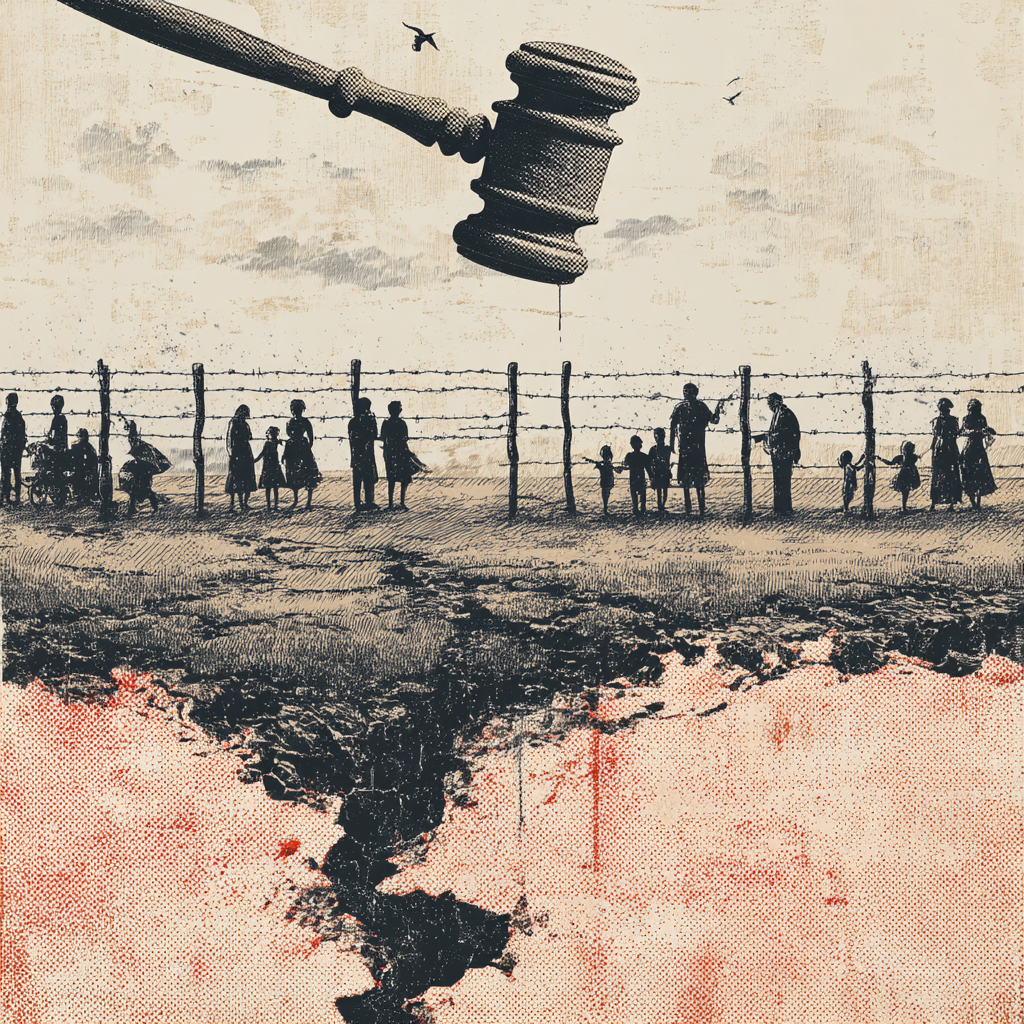Introduction
The U.S. criminal justice system is no stranger to controversy, but a recent proposal reportedly floated by former President Donald Trump has set off alarm bells among legal experts, advocacy groups, and concerned citizens alike. The idea—suggesting that “homegrown criminals” convicted of violent crimes could be relocated to foreign prisons, specifically to facilities built in El Salvador—poses deep constitutional, ethical, and logistical questions. The scenario becomes even more concerning when viewed through the eyes of people with criminal records or marginalized backgrounds, who often bear the brunt of experimentations in policy.
Highly publicized by major news outlets, the proposed plan involves U.S. citizens being sent to El Salvador to serve their sentences for violent crimes, potentially on the basis that housing prisoners would be cheaper abroad. Legal experts have immediately decried the concept as both unconstitutional and deeply problematic for a host of other reasons. And for families of those incarcerated, the potential ramifications are devastating: how do you visit a loved one when their prison cell is thousands of miles away, under a foreign justice system? In this article, we break down what these proposals mean, examine the risks, and answer the central question: should Americans, particularly those labeled as “homegrown criminals,” be worried?
The Proposal: Sending U.S. Citizens to Foreign Prisons
The controversy centers around claims that President Trump, in conversations with El Salvador’s president, considered a plan in which Americans convicted of violent crimes would serve their sentences in facilities outside U.S. borders. While the term “deporting” was initially bandied about, more accurate descriptions use “relocation” or “transferring” prisoners.
Key Points from the Discussion:
– U.S. would pay El Salvador to build and maintain prisons for American citizens.
– The program would target those labeled as “homegrown criminals.”
– Legal experts immediately responded, calling the idea unconstitutional.
This proposal echoes a longstanding practice in some U.S. states, where prisoners are sent to out-of-state facilities due to overcrowding. For instance, Vermont’s overcrowded prisons have led to inmates being housed in Idaho. However, relocating prisoners to another country—especially U.S. citizens—raises a host of new challenges.
Constitutional and Legal Considerations
Can the U.S. Legally Relocate Its Own Citizens to Foreign Prisons?
At the heart of the debate is a constitutional question: can the United States government send its own citizens—born and raised on American soil—to serve prison time abroad? The U.S. Constitution and case law provide strong protections against involuntary expatriation or deportation of citizens. As legal analyst Larry points out, “You can’t deport your own citizens that were born in the United States.”
Key Legal Obstacles:
– Citizens’ Rights: U.S. citizens cannot be involuntarily banished from their country (see Supreme Court case Trop v. Dulles).
– Due Process: Any relocation would require due process and an opportunity for judicial review.
– International Law: Housing citizens abroad could violate treaties or human rights conventions.
Andy, acting as moderator in the original discussion, raises concerns about the speed with which such relocations could happen and the possibility that government officials might act before courts can intervene.
“I’m puzzled, curious, concerned that they could act so fast on this that you might not be able to get through a court system fast enough to get a judge to make them stop.” – Andy
Moreover, if the U.S. government were to ignore a judge’s order—such as in the real example where a person with legal U.S. status was deported against a judicial order—this could undermine the entire basis of legal and constitutional protections afforded to all Americans.
Precedents and Analogies: U.S. Prisoners in Other Jurisdictions
To further clarify, the U.S. already has a precedent for transferring inmates between states due to overcrowding. Prisoners remain under their home state’s jurisdiction, even if they are housed elsewhere. Theoretically, the federal government could adapt this model for international transfers:
- Custodial Responsibility: The prisoner stays in U.S. custody, even when housed in El Salvador.
- Prosecution Risk: If an American prisoner commits a crime while in a foreign prison, they would be subject to the host country’s laws as well as U.S. oversight.
- Logistical Questions: Who provides legal, medical, and social services? How do families stay in touch, and what rights do inmates retain?
Legal experts, including those in the original transcript, doubt the practicality or legality of this analogy on an international scale.
The Human Impact: Families, Access, and Dignity
Perhaps the most immediate concern is the impact on prisoners and their families. If a loved one is sent to El Salvador, what does that mean for visitation, support, and rehabilitation prospects?
“When you have to go to San Salvador to visit your loved one, I’m betting you won’t think it’s nearly as funny as you do right now.” – Larry
- Family Separation: Travel to El Salvador is costly, dangerous, and impractical for most families.
- Access to Counsel: Prisoners lose easy access to U.S.-based lawyers, advocates, and court systems.
- Rights and Protections: U.S. constitutional rights may not be enforceable in a foreign prison.
The idea is likely to disproportionally impact marginalized communities—people of color, immigrants, and low-income individuals—further entrenching existing inequalities. As Andy notes, it’s essential to recognize who is most at risk:
“I would worry more about the people that are less white… it seems that they’re more easily identifiable that way.”
Conditions in Foreign Prisons: Medical Care and Treatment
Even if modern facilities were constructed in El Salvador, there are significant concerns about the level of care and professionalism compared to U.S. standards.
- Medical Care: U.S. prison medical care is often criticized, but experts suggest conditions abroad could be even worse.
- Professionalism: Correctional officers abroad may be less trained or held to lower standards.
- Human Rights Oversight: International transparency and inspection of prison conditions are less robust.
Supporting data: According to the U.S. State Department’s 2022 Human Rights Report, Salvadoran prisons are frequently criticized for overcrowding and inadequate medical care.
“I would imagine that the care that you get in most U.S. prisons would be better than what you would get [in El Salvador].” – Larry
The Ethical and Political Fallout
The bigger question is: What are the broader implications of a U.S. administration ignoring the Constitution, court orders, and basic human rights? If such a policy were enacted, it could erode trust in the rule of law and set a dangerous precedent.
- Ignoring Courts: The original transcript references cases where the administration allegedly ignored judicial orders.
- Rule of Law: Flouting constitutional limits weakens the fabric of American democracy.
- Potential for Abuse: If the government can relocate prisoners abroad, what other rights might erode?
As Larry warns, those who support tough-on-crime policies now may feel differently if a family member is targeted:
“How are you gonna feel when… they flip the middle finger at the court and say, what are you gonna do about it? Are you gonna be okay with that?”
Conclusion: Should Americans Be Worried?
The proposal to send American citizens to foreign prisons is, at present, more of a thought experiment or political talking point than an imminent threat. However, the legal, ethical, and human harms are clear:
- It would likely violate the Constitution and established legal precedent.
- It would devastate prisoner families and worsen existing inequalities.
- It would represent a serious degradation of the U.S. commitment to rule of law.
While unlikely to pass constitutional muster, the very suggestion signifies a concerning authoritarian trend—one which all Americans, not just those with criminal convictions, should watch with vigilance.
Actionable Takeaways
- Stay Informed: Follow reliable legal analysis on developments in criminal justice policy, not just headlines or political statements.
- Engage with Advocacy: Support organizations working to defend prisoner rights and uphold constitutional protections.
- Contact Elected Officials: Express your concerns about proposals to export American prisoners and demand respect for judicial rulings and human rights.
References
- U.S. Supreme Court – Trop v. Dulles (1958)
- U.S. State Department Country Reports on Human Rights Practices: El Salvador 2022
- AP News Story on El Salvador’s Prisons
- Prison Policy Initiative: Prison Conditions and Transfers
Final Thought:
Even if the prospect of American citizens being sent to El Salvadoran prisons seems far-fetched, the conversation highlights the fragility of constitutional protections when faced with fear-driven policies. Remaining vigilant, informed, and engaged is essential to safeguarding everyone’s rights.






Leave a Comment